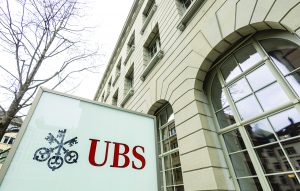BLOOMBERG
UBS Group AG is gearing up for an estimated $34.8 billion gain as a result of its emergency takeover of Credit Suisse Group AG, while warning it faces billions in potential legal and regulatory costs from the rescue of its stricken former rival.
The Swiss bank stands to benefit from the combined firms’ negative goodwill, based on a first assessment it has made on data as of the end of 2022, according to a regulatory filing posted in Switzerland. At the same time, UBS sees markdowns of about $13 billion on Credit Suisse assets and is also estimating that legal liabilities may cost as much as $4 billion over 12 months.
The figures are based on the bank’s best estimates now, and as further analysis is performed are likely to change, UBS said. Negative goodwill
occurs when the book value of a company is more than the price paid by the acquiring firm, and can result in a profit on paper for the buyer when the deal closes.
UBS agreed to take over Credit Suisse this year in an emergency sale backed by the Swiss government, amid fears that the smaller troubled competitor was hurtling toward bankruptcy. Analysts have pointed out that Credit Suisse’s local business, the Swiss Universal Bank, is probably worth multiple times what UBS paid for the company.
UBS shares fell after the open in Zurich on Wednesday before reversing losses, trading up 0.3% at 17.22 Swiss francs ($19.134).
Still, if UBS reports a windfall from negative goodwill, many investors will view it as an accounting quirk rather than a sign of strength of the underlying business. And executives, aware that a paper windfall could prove unpopular in Switzerland, have been quick to point out the risks they’re taking on in an integration that may take several years.
The accounting gain stands to be among the biggest ever reported by a bank in a single quarter, potentially easily surpassing the previous benchmark. JPMorgan Chase & Co’s $14.3 billion profit in the first quarter of 2021 is the modern record for US and European lenders.
UBS is benefiting from a 9 billion Swiss franc state guarantee for a certain portion of losses that it may incur on Credit Suisse positions. Yet UBS Chief Executive Officer Sergio Ermotti said that it was “exceptionally unlikely†that the government will end up taking a financial hit.
Bloomberg had previously reported that the bank could make a gain of as much as 51 billion Swiss francs from the negative goodwill before any assets write-downs. That was based on calculations of Credit Suisse book value of 54 billion francs at the end of March and the 3 billion francs UBS is paying.
Nevertheless the bank made a series of preliminary estimates on the mark-downs that may be needed when the deal closes. A revaluation of some $5.9 billion was estimated on assets including Swiss mortgages and one of $3 billion on trading assets including those that the bank will ultimately exit. UBS has indicated that it plans to significantly shrink Credit Suisse’s loss-making investment bank.
UBS staff are currently involved in a process of due diligence into its acquired rival, with the deal set to close in the coming weeks.
Unlike in more standard acquisitions, UBS was unable to conduct a months-long review of the bank’s books.
UBS has sent in a so-called clean team to assess its former rivals’ client rosters and talent, as well as which business lines should be earmarked for a wind-down unit, people with knowledge of the matter have said.
 The Gulf Time Newspaper One of the finest business newspapers in the UAE brought to you by our professional writers and editors.
The Gulf Time Newspaper One of the finest business newspapers in the UAE brought to you by our professional writers and editors.
